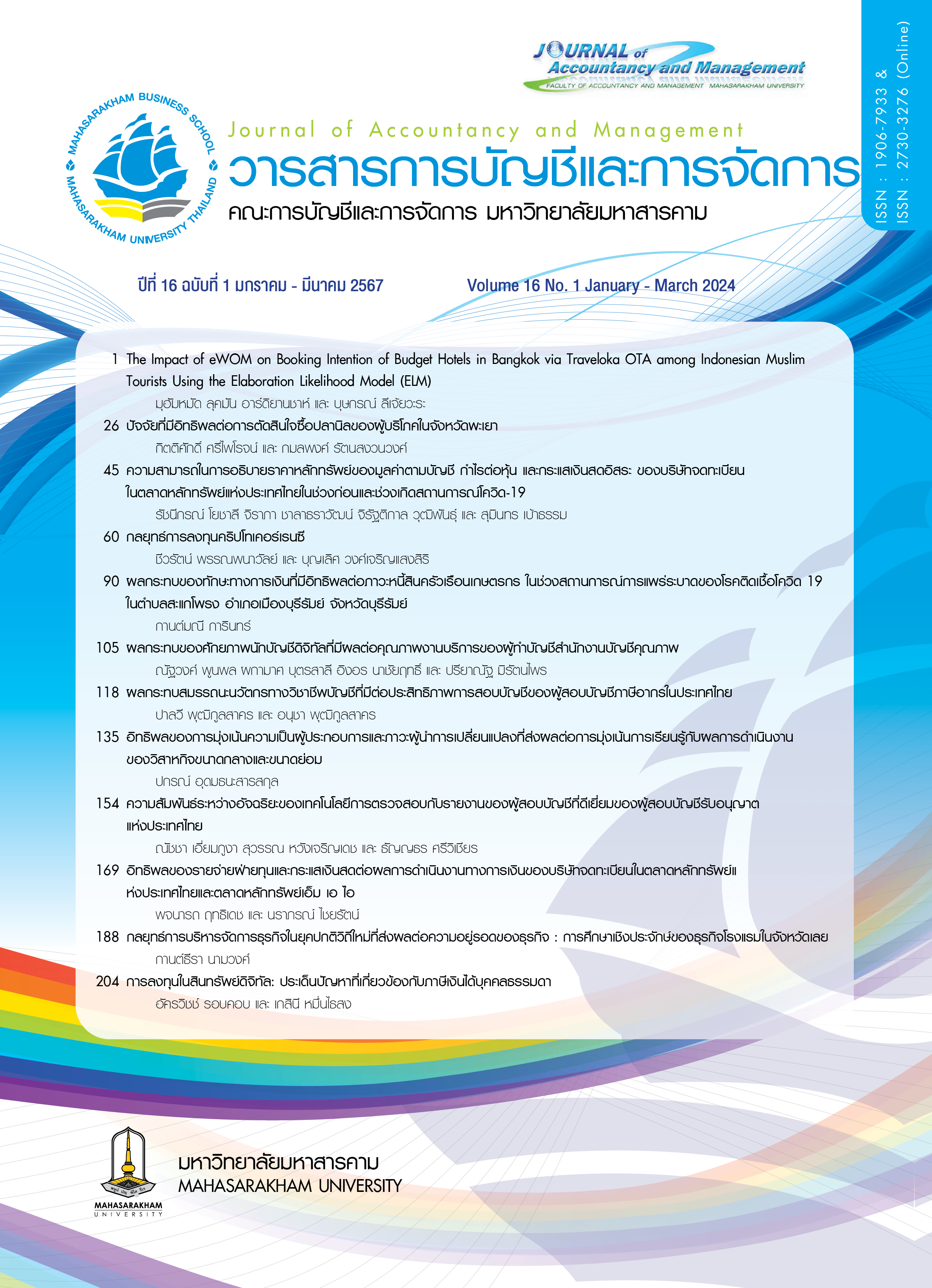ความสามารถในการอธิบายราคาหลักทรัพย์ของมูลค่าตามบัญชี กำไรต่อหุ้น และกระแสเงินสดอิสระของบริษัทจดทะเบียนในตลาดหลักทรัพย์แห่งประเทศไทยในช่วงก่อนและช่วงเกิดสถานการณ์โควิด-19
Main Article Content
บทคัดย่อ
งานวิจัยนี้มีวัตถุประสงค์เพื่อศึกษาความสามารถในการอธิบายราคาหลักทรัพย์ของมูลค่าตามบัญชี กำไรต่อหุ้น และกระแสเงินสดอิสระ ของบริษัทจดทะเบียนในตลาดหลักทรัพย์แห่งประเทศไทยในช่วงก่อนและช่วงเกิดสถานการณ์โควิด-19 ประชากรที่ใช้ในการวิจัย คือบริษัทจดทะเบียนในตลาดหลักทรัพย์แห่งประเทศไทยระหว่างปี พ.ศ. 2561 - 2564 ยกเว้นบริษัทในกลุ่มอุตสาหกรรมธุรกิจการเงิน บริษัทที่อยู่ระหว่างฟื้นฟูการดำเนินงาน กองทุนรวมอสังหาริมทรัพย์และกองทรัสต์เพื่อการลงทุน บริษัทที่มีข้อมูลไม่ครบถ้วน และบริษัทที่ปีงบการเงินที่ไม่ใช่ 31 ธันวาคม รวมจำนวนกลุ่มตัวอย่าง 2,356 ตัวอย่าง โดยใช้ค่าสัมประสิทธิ์เชิงพหุที่ปรับแล้ว (Adjusted R2) ในการอธิบายความสามารถในการอธิบายราคาหลักทรัพย์ และแบ่งการวิเคราะห์ออกเป็น 2 ช่วง ได้แก่ ช่วงก่อนสถานการณ์โควิด-19 (ปี พ.ศ. 2561 - 2562) และ ช่วงเกิดสถานการณ์โควิด-19 (ปี พ.ศ. 2563 -2564) ผลการศึกษาพบว่าความสามารถอธิบายราคาหลักทรัพย์ของมูลค่าตามบัญชี กำไรต่อหุ้น กระแสเงินสดอิสระ และขนาดของกิจการ ช่วงก่อนสถานการณ์โควิด- 19 และ ช่วงเกิดสถานการณ์โควิด-19 มีค่าลดลงจาก 67.40% เป็น 51.10% และเมื่อพิจารณาค่าสัมประสิทธิ์ถดถอยของตัวแปรอิสระพบว่า กำไรต่อหุ้นมีค่าสูงที่สุด ช่วงก่อนสถานการณ์โควิด-19 มีค่าเท่ากับ 5.517 และ ช่วงเกิดสถานการณ์โควิด-19 มีค่าเท่ากับ 1.543 และมีนัยสำคัญทางสถิติ (p-value < 0.01) สรุปได้ว่ากำไรต่อหุ้นยังเป็นข้อมูลที่มีความสำคัญและมีความหมาย ต่อนักลงทุนที่จะใช้เป็นข้อมูลในการตัดสินใจลงทุนที่สะท้อนถึงราคาหลักทรัพย์มากที่สุด และมีความสามารถอธิบายหลักทรัพย์ได้ลดลงในช่วงที่เกิดสถานการณ์โควิด-19
Downloads
Article Details

อนุญาตภายใต้เงื่อนไข Creative Commons Attribution-NonCommercial-NoDerivatives 4.0 International License.
บทความที่ได้รับการตีพิมพ์เป็นลิขสิทธิ์ของวารสารการบัญชีและการจัดการ
ข้อความที่ปรากฏในบทความแต่ละเรื่องในวารสารวิชาการเล่มนี้เป็นความคิดเห็นส่วนตัวของผู้เขียนแต่ละท่านไม่เกี่ยวข้องกับมหาวิทยาลัยมหาสารคาม และคณาจารย์ท่านอื่นๆในมหาวิทยาลัยฯ แต่อย่างใด ความรับผิดชอบองค์ประกอบทั้งหมดของบทความแต่ละเรื่องเป็นของผู้เขียนแต่ละท่าน หากมีความผิดพลาดใดๆ ผู้เขียนแต่ละท่านจะรับผิดชอบบทความของตนเองแต่ผู้เดียว
เอกสารอ้างอิง
กิตติมา อัครนุพงศ์. (2560).การเปรียบเทียบความเกี่ยวข้องในการกำหนดมูลค่าหลักทรัพย์ของกำไร มูลค่าตามบัญชีและกระแสเงินสด: หลักฐานเชิงประจักษ์จากบริษัทจดทะเบียนในกลุ่ม SET 100 ในประเทศไทย. วารสาร วิชาชีพบัญชี, 13(38), 95-111.
ณัฐกานต์ ศรีวิชัย. 2559.ความสัมพันธ์ของผลการดำเนินงานกับค่าตอบแทนผู้บริหารของบริษัทที่จดทะเบียนในตลาดหลักทรัพย์แห่งประเทศไทย. การค้นคว้าอิสระปริญญาบัญชีมหาบัณฑิต มหาวิทยาลัยเชียงใหม่.
ตลาดหลักทรัพย์แห่งประเทศไทย. (2563). ภาพตลาดทุนไทย หลังเหตุการณ์ COVID-19. เผยแพร่บนหนังสือพิมพ์กรุงเทพธุรกิจ 11 มิถุนายน 2563,ค้นจาก https://www.sec.or.th/TH/Template3/Articles/2563/110663.pdf
พัชรินทร์ บุญนุ่น ดลนภา พูลคล้าย และประทุมมาศ จันทสุวรรณ. (2560). การศึกษามูลค่าทางบัญชีที่ส่งผลต่อราคาหลักทรัพย์ของบริษัทที่จดทะเบียนในตลาดหลักทรัพย์แห่งประเทศไทย กลุ่มเกษตรและอุตสาหกรรมอาหาร.การประชุมวิชาการระดับนานาชาติและนานาชาติด้านบริหารธุรกิจและการบัญชี 2561,22-23 กุมภาพันธ์ 2563 ณ มหาวิทยาลัยขอนแก่น จังหวัดขอนแก่น, 302-310.
พัทธ์ธีรา จิรอุดมสาโรจน์. (2560). ความสัมพันธ์มูลค่าราคาตามบัญชี กำไรต่อหุ้นและเงินปันผล ของบริษัทที่
จดทะเบียนในตลาดหลักทรัพย์แห่งประเทศไทยกลุ่มดัชนี SET 100,วารสารวิชาการ มหาวิทยาลัยธนบุรี, 11(25), 99-106.
ยศวินกาญจน์ กอบกาญจนพฤติ และภัทรณัชชา โชติคุณากิตติ. (2564). ความเกี่ยวข้องของมูลค่าตามบัญชี กำไรทางบัญชี และกระแสเงินสดจากการดำเนินงานในการอธิบายราคาหลักทรัพย์ของบริษัทจดทะเบียนไทย
ในช่วงสถานการณ์ COVID-19. วารสารรัชต์ภาคย์, 15(40), 79-92.
วนิดา ชุติมากุล บรรจงรัตน์ พรหมสุวรรณศิริ และสุรินทร์ พรหมนุรักษ์กิจ. (2565).ความเกี่ยวข้องกับการตัดสินใจของข้อมูลทางการบัญชีต่อราคาหลักทรัพย์: หลักฐานเชิงประจักษ์ของบริษัทจดทะเบียนในตลาดหลักทรัพย์แห่ง ประเทศไทย. วารสารนวัตกรรมและการจัดการ, 7(1), 82-95.
ศุภวัฒน์ วัฒน์ธนปติ, พิรุณา ไบโลวัส และเวทางค์ พ่วงทรัพย์. (2555). การทดสอบความมีประสิทธิภาพของตลาดหลักทรัพย์แห่งประเทศไทยในมิติของข้อมูลข่าวสารที่เกี่ยวกับนโยบายทางการเงินของประเทศสหรัฐอเมริกา.วารสารสุทธิปริทัศน์, 109-130.
สภาวิชาชีพบัญชี. (2566). คู่มืออธิบายกรอบแนวคิดสำหรับการรายงานทางการเงิน.ค้นเมื่อวันที่ 18 พฤษภาคม 2566,จาก https://www.tfac.or.th/upload/9414/IhJcrKfW69.pdf
อนุวัฒน์ ภักดี และศิลปะพร ศรีจั่นเพชร. (2563).ความเกี่ยวข้องของข้อมูลบัญชีกับราคาหลักทรัพย์ในกลุ่มอุตสาหกรรมธุรกิจ การเงิน มุมมอง 15 ปี, วารสารวิชาการบริหารธุรกิจ, 9(1), 205-211.
Ahmadi, A., & Bouri, A. (2018). The Accounting Value Relevance of Earnings and Book Value: Tunisian Banks and Financial Institutions. International Journal of Law and Management, 60(2), 342-354.
Bhandari, S. B., & Adams, M. T. (2017). On the Definition, Measurement, and Use of the Free Cash Flow Concept in Financial Reporting and Analysis: A review and Recommendations. Journal of Accounting and Finance, 17(1), 11-19.
Devall, A. (2012). Value Relevance of Accounting Data and Financial Crisis in European Empirical Analysis. International Journal of Accounting and Financial Reporting, 2(2), 201-217.
Fama, E. (1991). Efficient Capital Markets: II. Journal of Finance, 46, 1575-1617.
Francis, J., & Schipper, K. (1999). Have Financial Statements Lost Their Relevance? Journal of Accounting Research, 37(2), 319-353.
Fu, J., Xu, F., Zeng, C., & Zheng, L. (2022). Free Cash Flows and Price Momentum. Journal of Accounting, Auditing and Finance, forthcoming, April 2022, 1-28.
Graham, R., King, R., & Bailes, J. (2000). The value Relevance of Accounting Information Durung a Financial Crisis: Thailand and the 1997 Decline in the Value of the Baht. Journal of International Financial Management & Accounting, 11(2), 84-107.
Hassan, N., & Haque, H. M. M. (2017). Role of Accounting Information in Assessing Stock Prices in Bangladesh, International Journal of Business and Social Research, 7(20), 18-25.
Ho, L. J., Liu, C. S., & Sohn, P. S. (2001). The Value Relevance of Accounting Information Around the 1997 Asian Financial Crisis the Case of South Korea. Asia-Pacific Journal of Accounting & Economics, 8(2), 83-107.
Kumari, S. (2008). Multicollinearity: Estimation and Elimination. Journal of Contemporary Research in Management, 3(1), 87-95.
Ohlson, J. A. (1995). Earnings, Book Values, and Dividends in Equity Valuation. Journal of The Canadian Academic Accounting Association, 11(2), 661-687.
Puspa, D. F., Nazaruddin, L., Muslim, R. Y., & Minovia A. F. (2023). Relevance of Earning Value, Book Value, and Operating Cash Flow in Manufacturing Companies in Indonesia. Journal of Accounting and Investment, 24(1), 120-136.
Sari, C. T. & Suharti M., (2021). The Effect of Taxes, Earning Per Share, and Sales Growth on Stock Prices in the Covid-19 Pandemic (Empirical Study of Health and Pharmaceutical Sector Listed in the Jakarta Stock Exchange 2016-2020. International Journal of Economics, Business and Accounting Research (IJEBAR), 5(2), 530-540.
Senthilnathan, S., & Kajoon, H. (2013). Role of the Net Assets in Assessing the Relevance of Earnings. Journal of Commerce & Accounting Research, 2(3), 32-38
Spence, M. (1973). Job Market Signaling. Quarterly Journal of Economic, 87(3), 355–374


